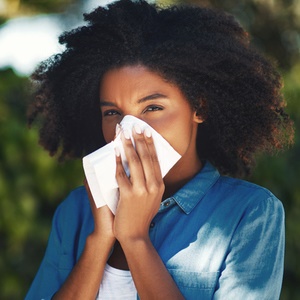
Global warming is having a noticeable effect on things from animal life to glaciers, to weather patterns and food production. Even human health, it seems, is not immune from the ravages of climate change.
According to research, a changing climate due to global warming can exacerbate the symptoms of existing seasonal allergies, as well as cause new cases.
There are three main reasons why global warming may have such far-reaching effects on allergies:
1. The increased levels of carbon dioxide influence the growth of plants, which leads to increased pollen and mould levels. And if you already suffer from hay fever, such increases will naturally worsen your symptoms. According to a study presented by allergist Leonard Bielory, pollen counts are expected to double by 2040.
"Climate changes will increase pollen production considerably in the near future in different parts of the country. Economic growth, global environment sustainability, temperature and human-induced changes, such as increased levels of carbon dioxide, are all responsible for the influx that will continue to be seen,” Bielory said.
This will not only worsen existing allergy symptoms but can also cause allergies in those who previously didn't suffer from seasonal allergies.
While this research is based in North America, global warming is causing increasing temperatures all over the world, and will undoubtedly affect every continent.
It’s not only an increase in the amount of pollen that matters, but also an increase in the prevalence of allergies caused by pollen. Rising carbon dioxide levels increase the amount of allergenic peptides on the pollen. These peptides are responsible for triggering the body’s immune system and the more peptides on the pollen, the more likely that you will be affected by hay fever.
2. The second reason an increase in allergies is the increasing length of the allergy season. As temperatures soar, springs get longer, which increases our exposed to pollen.
3. The third reason is that severe weather phenomena such as flooding in certain areas can increase damp in buildings, leading to mould exposure, which can trigger allergies.
Those with asthma also at risk
Climate change also seems to pose a big risk to those with respiratory conditions such as asthma. Current data shows that climate change can directly cause or aggravate existing respiratory allergy conditions.
What you can do:
- Monitor the pollen count and air quality by making use of a weather app. Limit outdoor activities when the pollen and pollution counts are high.
- Talk to your doctor about your current treatment plan and whether you need to change your medication.
- Keep pollen outside. Remove your shoes before walking through the rest of the house; try taking a shower and changing your clothes immediately when you come inside; and vacuum regularly to remove pollen and dust.
- Keep your house free of mould, especially if you live in a humid area.
Image credit: iStock




 Publications
Publications
 Partners
Partners












